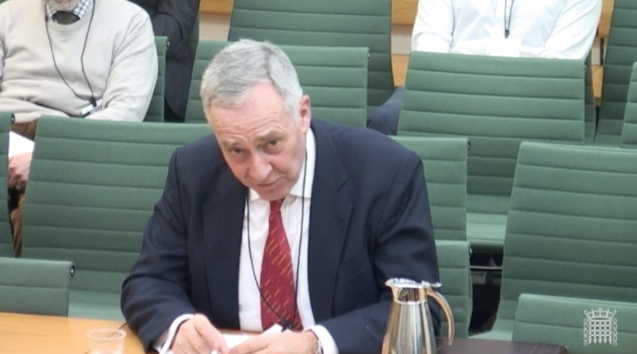Extremism 'difficult to legally define', says ex-UK terrorism watchdog

The UK's former independent terrorism law watchdog has said any attempt by the government to create criminal laws on "extremism" would lead it into a potential legal minefiled due to the difficulties of defining the term.
David Anderson told the Home Affairs select commitee on Tuesday that an official definition was unneccesary in a policy based on encouraging diversity and tolerance, and said attempts to legislate against "extremist activity" would need a definition of "extremist" that would stand in court.
The comments come days after the appointment of Britain's first counter-extremism commission, Sara Khan, and after proposals in 2015 and 2016 to create new "anti-extremist" laws.
"It’s not that I think a counter-extremism strategy is a bad thing if [it is] about encouraging people to see the virtues of values of diversity and tolerance," he said. "If you can’t define what you are talking about, well it doesn’t stop you having policies - who can define mental health problems? That doesn't stop us having mental health intervention.
"But where I have difficulty is if it suddenly becomes coercive [criminal]... When you start having coercive laws and say we're going to put people under extremist disruption orders if they indulge in extremism activity, and you can't define extremist activity, except by reference to not promoting British values or something like that, then I think you are in trouble.
"Because criminal law, coercive law of any kind, can’t afford to be as vague as that. So I don’t really understand at the moment what the counter-extremism commission is being designed to do.
His comments come a year after Middle East Eye reported that the Home Office had not settled on a precise legal definition of extremism; despite pledging to deliver a counter-terror strategy to "defeat the extremists".
Critics of the UK government's counter-terror laws have demanded a definition of extremism, as Britain continues to base its policies on multiple definitions of the term extremism.
The Home Affairs select committee convened the session on counter-terrorism on Tuesday in light of the 2017 Manchester attacks that killed 23 people and injured 119.
On Friday, more than 100 Muslim organisations condemned the appointment of Sara Khan to be the UK's first commissioner for countering extremism.
Anderson, who was the independent reviewer of terrorism legislation for six years, defended Khan on Twitter, saying the idea that she was a "government stooge was hard to reconcile, with her opposition to the counter-extremism bill."
He urged Khan to be given a "fair chance" and for the Muslim community to reserve judgement "till the commission is (fully) assembled."
"I saw a reference in the job description to 'stopping scourge of extremism'," he said.
"And if that means the sort of coercive measure I describe then I think I have reservations about it... But then it also says that the aim is to discuss with individuals from all areas of society, and from the new lead commission that is how she intends to begin.
"As far as I’m concerned the jury is out. If I might permit myself a comment on the new lead commissioner appointment, I am very encouraged by two things: one is her insistence on human rights as a starting point… and second point is that, even to the joint committee on human rights, she expressed views similar to mine on the coervise laws being proposed in 2015 and 2016.
"I did not get the impression from her evidence that that was the approach she thought would be productive. "
The former terror watchdog also voiced concerns over the police using Schedule 7 to stop individuals "suspected of being spies or involved in nuclear proliferation" instead of terrorism-related activities.
Introduced as part of the 2000 Terrorism Act, Schedule 7 gives police and some immigration officers the power to hold any person at an airport or port for six hours without any cause of suspicion, to determine if the individual could be a terrorist.
In 2017 David Anderson left his position as the Independent Reviewer of Terrorism legislation. During his tenure, Anderson concluded that the Manchester attack could have been prevented and revealed MI5 was actively monitoring the leader of the London Bridge attacks.
New MEE newsletter: Jerusalem Dispatch
Sign up to get the latest insights and analysis on Israel-Palestine, alongside Turkey Unpacked and other MEE newsletters
Middle East Eye delivers independent and unrivalled coverage and analysis of the Middle East, North Africa and beyond. To learn more about republishing this content and the associated fees, please fill out this form. More about MEE can be found here.




